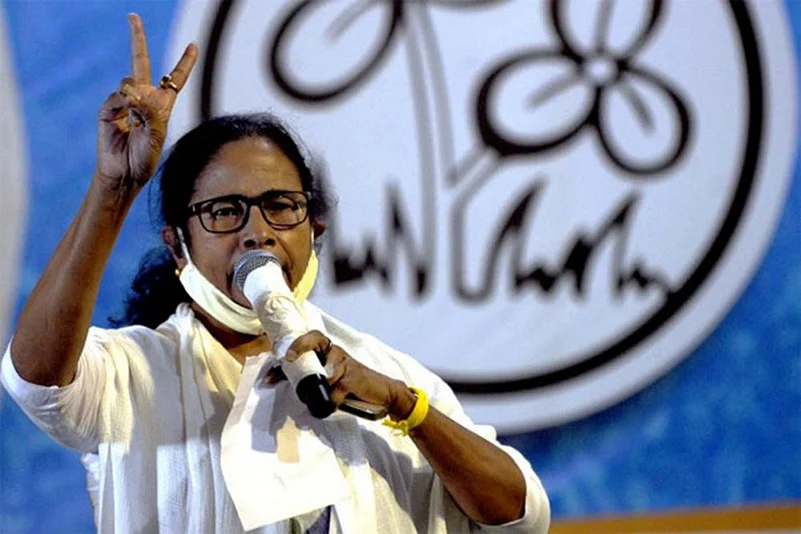While the outcome of the West Bengal Assembly election was surprising on one hand, it also provided a glimmer of hope to many.
Even as the BJP roped in all its top guns including Prime Minister Narendra Modi, Union home minister Amit Shah and Uttar Pradesh Chief Minister Yogi Adityanath for campaigning, the TMC relied solely on its supremo Mamata Banerjee.
And apart from just tackling the saffron camp, Banerjee ensured that her party won the polls with a landslide victory, amid being injured and campaigning seated on a wheelchair.
The 2021 Bengal election was one-of-a-kind and it provides innumerable leadership lessons for political parties as well as individual politicians. Here’s a few of them--
* Growth and collaboration versus identity politics: The first lesson that we can take away from the election is that the ideas of growth and development are important values not just for various organisations but for the society at large. Our political parties need to formulate visions that accord maximum importance to these two concepts. A vision that focuses on growth, development and collaboration is an inspiring and motivating one.
Time and again it has been found that the values of division and hate are weak and cannot take on ideas of development and growth. While the BJP, did promise to usher in growth, it also tried to polarise the voters through its “us versus them” narrative.
The saffron party’s high-pitched poll campaign centred around Jai Shri Ram slogans, illegal migration, TMC’s alleged Muslim appeasement and anti-Romeo squads. And in this cacophony, its message of development got lost.
Mamata Banerjee, on the other hand, promised growth and development for all in her party’s manifesto and emphasized that “we all live together, eat together, and together we save each other's lives.”
Lokniti-CSDS’s post-poll survey shows that BJP failed to retain the Hindu support it had secured during the 2019 general elections in the state, and that many respondents (including Hindus) gave secular answers to questions on issues such as protecting minority rights. This goes to show that issues of development and livelihood may be more important to people than that of social identities.
* Empathy and connect: A recent trend with regards to BJP’s poll performance in various states is that the party fails to project a chief ministerial face. It did the same in Bengal while the TMC clearly projected Banerjee as its leader. People connect better with personalities than parties.
Every organisation needs leaders who can form a connect with their employees and can understand their pain. To do this, the leader must be present on the ground and must communicate directly with the people. In BJP’s case, leaders flew in from outside the state, did mass rallies and went back to their respective cities. There was no one who could forge that connect with the people of Bengal. The local leaders were shadowed by the senior leaders who were flown in from various parts of the country.
Our organizations (governments and political parties included) desperately need to showcase a lot more understanding, empathy and care. Flying visits, a flurry of election rallies, road shows can produce excitement but not connect. To form connect, we need leaders who can stay on the ground, spend time with people, learn and understand what people want and then work for their development. Local leaders do this job the best.
* Authenticity: Authenticity is the value of doing what you preach (walk the talk) and leading by example. The strongest form of communication is leading by example. No number of rallies or road shows can achieve what actions can. While on one hand the leaders took out massive rallies and road shows in election-bound states where people gathered in large numbers, on the other hand the same leaders were talking about following social distancing and COVID-appropriate behaviour in Delhi.
Authenticity is the hallmark of truly great leaders. Such leaders strive to follow the path of truth and fairness when dealing with others. When leaders do not do what they say, it creates a dent in their popularity, people’s perception of their personality as well as their honesty. One of the problems that Indian politics faces is the glaring absence of authenticity in the conduct of our leaders. It is ironic that while the BJP accused Trinamool of corruption and violence, it happily inducted Trinamool as well as Left leaders in its fold. So much for leading by example!
BJP would agree with Nelson Mandela’s quote, “after climbing a great hill, one only finds that there are many more hills to climb.” BJP scaled the great hill (of coming to power) in the 2014, and then again in 2019 general elections. However, its performance in smaller hills (state elections) has only been poor (barring a few exceptions such as UP and Assam). Hopefully, the party leaders will realise that scaling these peaks will be as challenging (if not more) as scaling the highest peak.
It is unfortunate that the Bengal election results have given rise to post-poll violence. Also, Mamata Banerjee must realise that her win comes in the backdrop of significant change in Bengal’s electoral politics. BJP has emerged as the clear Opposition in Bengal and the party’s performance, while below expectations, is not meaningless. As the chosen leader of the state, the elected Chief Minister of Bengal must now fulfil her electoral promises and stand true to the values of growth, empathy and authenticity.
(The author is is an associate professor (Organizational Behaviour Area) at the Indian Institute of Management Ahmedabad. He is also the chairperson of the Ashank Desai Centre for Leadership and Organisational Development at IIM Ahmedabad. Views expressed are personal and do not necessarily reflect those of Outlook Magazine.)





















